Professional Practice and Legislation in Healthcare: A Case Study Analysis
VerifiedAdded on 2023/06/18
|9
|2599
|203
AI Summary
This report analyzes a case study in healthcare and discusses legal and ethical issues. It identifies relevant healthcare legislations in New Zealand and provides recommendations to prevent such situations in the future.
Contribute Materials
Your contribution can guide someone’s learning journey. Share your
documents today.
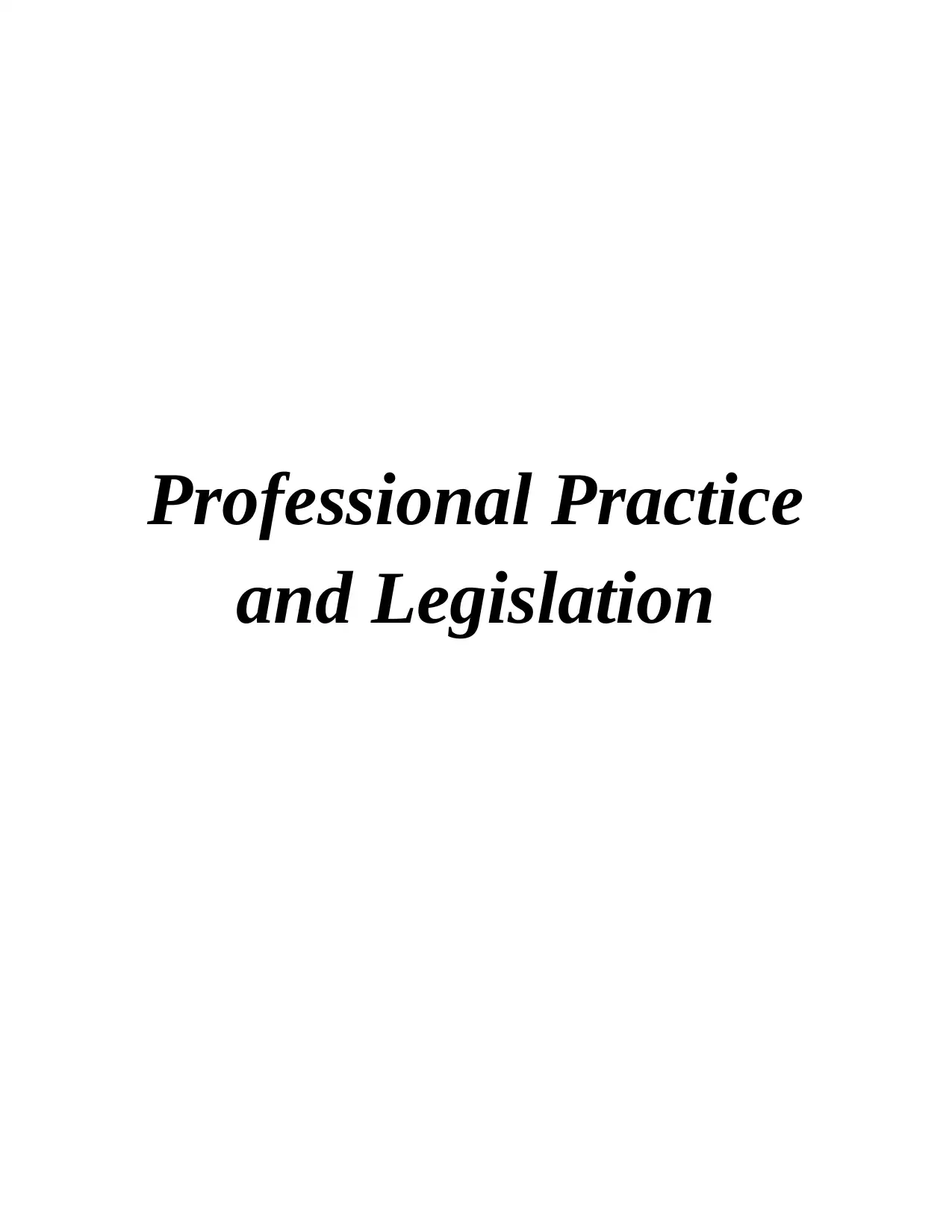
Professional Practice
and Legislation
and Legislation
Secure Best Marks with AI Grader
Need help grading? Try our AI Grader for instant feedback on your assignments.
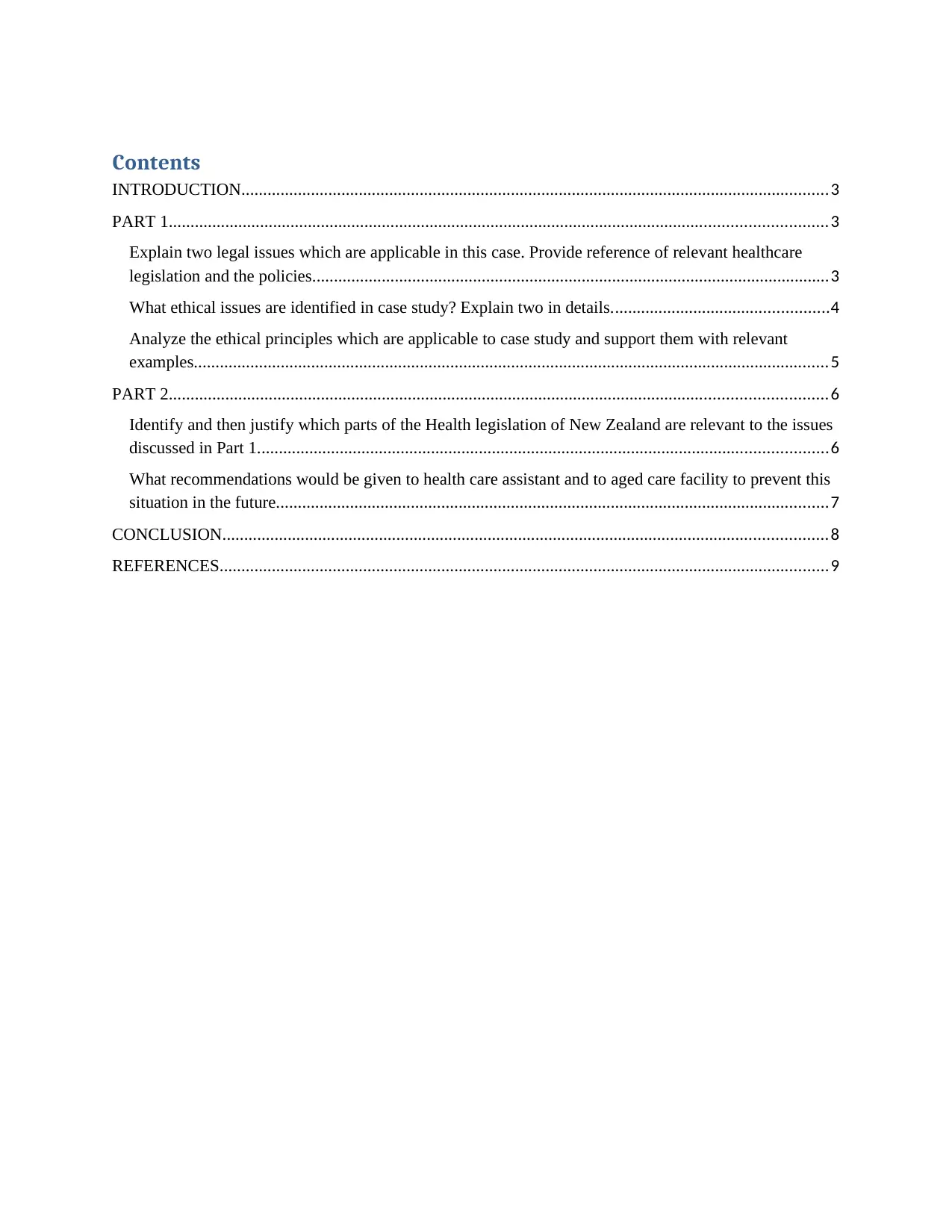
Contents
INTRODUCTION.......................................................................................................................................3
PART 1.......................................................................................................................................................3
Explain two legal issues which are applicable in this case. Provide reference of relevant healthcare
legislation and the policies.......................................................................................................................3
What ethical issues are identified in case study? Explain two in details..................................................4
Analyze the ethical principles which are applicable to case study and support them with relevant
examples..................................................................................................................................................5
PART 2.......................................................................................................................................................6
Identify and then justify which parts of the Health legislation of New Zealand are relevant to the issues
discussed in Part 1...................................................................................................................................6
What recommendations would be given to health care assistant and to aged care facility to prevent this
situation in the future...............................................................................................................................7
CONCLUSION...........................................................................................................................................8
REFERENCES............................................................................................................................................9
INTRODUCTION.......................................................................................................................................3
PART 1.......................................................................................................................................................3
Explain two legal issues which are applicable in this case. Provide reference of relevant healthcare
legislation and the policies.......................................................................................................................3
What ethical issues are identified in case study? Explain two in details..................................................4
Analyze the ethical principles which are applicable to case study and support them with relevant
examples..................................................................................................................................................5
PART 2.......................................................................................................................................................6
Identify and then justify which parts of the Health legislation of New Zealand are relevant to the issues
discussed in Part 1...................................................................................................................................6
What recommendations would be given to health care assistant and to aged care facility to prevent this
situation in the future...............................................................................................................................7
CONCLUSION...........................................................................................................................................8
REFERENCES............................................................................................................................................9
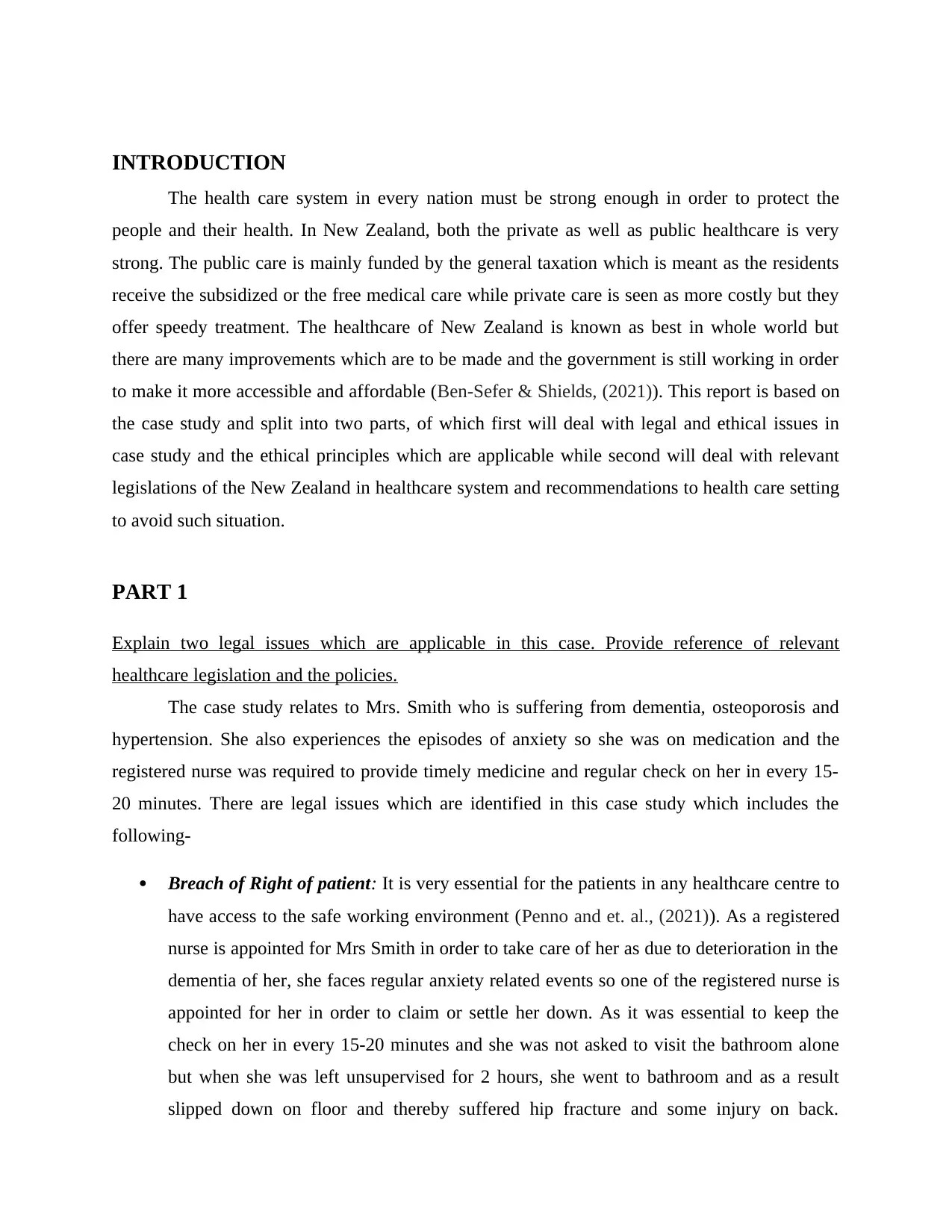
INTRODUCTION
The health care system in every nation must be strong enough in order to protect the
people and their health. In New Zealand, both the private as well as public healthcare is very
strong. The public care is mainly funded by the general taxation which is meant as the residents
receive the subsidized or the free medical care while private care is seen as more costly but they
offer speedy treatment. The healthcare of New Zealand is known as best in whole world but
there are many improvements which are to be made and the government is still working in order
to make it more accessible and affordable (Ben-Sefer & Shields, (2021)). This report is based on
the case study and split into two parts, of which first will deal with legal and ethical issues in
case study and the ethical principles which are applicable while second will deal with relevant
legislations of the New Zealand in healthcare system and recommendations to health care setting
to avoid such situation.
PART 1
Explain two legal issues which are applicable in this case. Provide reference of relevant
healthcare legislation and the policies.
The case study relates to Mrs. Smith who is suffering from dementia, osteoporosis and
hypertension. She also experiences the episodes of anxiety so she was on medication and the
registered nurse was required to provide timely medicine and regular check on her in every 15-
20 minutes. There are legal issues which are identified in this case study which includes the
following-
Breach of Right of patient: It is very essential for the patients in any healthcare centre to
have access to the safe working environment (Penno and et. al., (2021)). As a registered
nurse is appointed for Mrs Smith in order to take care of her as due to deterioration in the
dementia of her, she faces regular anxiety related events so one of the registered nurse is
appointed for her in order to claim or settle her down. As it was essential to keep the
check on her in every 15-20 minutes and she was not asked to visit the bathroom alone
but when she was left unsupervised for 2 hours, she went to bathroom and as a result
slipped down on floor and thereby suffered hip fracture and some injury on back.
The health care system in every nation must be strong enough in order to protect the
people and their health. In New Zealand, both the private as well as public healthcare is very
strong. The public care is mainly funded by the general taxation which is meant as the residents
receive the subsidized or the free medical care while private care is seen as more costly but they
offer speedy treatment. The healthcare of New Zealand is known as best in whole world but
there are many improvements which are to be made and the government is still working in order
to make it more accessible and affordable (Ben-Sefer & Shields, (2021)). This report is based on
the case study and split into two parts, of which first will deal with legal and ethical issues in
case study and the ethical principles which are applicable while second will deal with relevant
legislations of the New Zealand in healthcare system and recommendations to health care setting
to avoid such situation.
PART 1
Explain two legal issues which are applicable in this case. Provide reference of relevant
healthcare legislation and the policies.
The case study relates to Mrs. Smith who is suffering from dementia, osteoporosis and
hypertension. She also experiences the episodes of anxiety so she was on medication and the
registered nurse was required to provide timely medicine and regular check on her in every 15-
20 minutes. There are legal issues which are identified in this case study which includes the
following-
Breach of Right of patient: It is very essential for the patients in any healthcare centre to
have access to the safe working environment (Penno and et. al., (2021)). As a registered
nurse is appointed for Mrs Smith in order to take care of her as due to deterioration in the
dementia of her, she faces regular anxiety related events so one of the registered nurse is
appointed for her in order to claim or settle her down. As it was essential to keep the
check on her in every 15-20 minutes and she was not asked to visit the bathroom alone
but when she was left unsupervised for 2 hours, she went to bathroom and as a result
slipped down on floor and thereby suffered hip fracture and some injury on back.
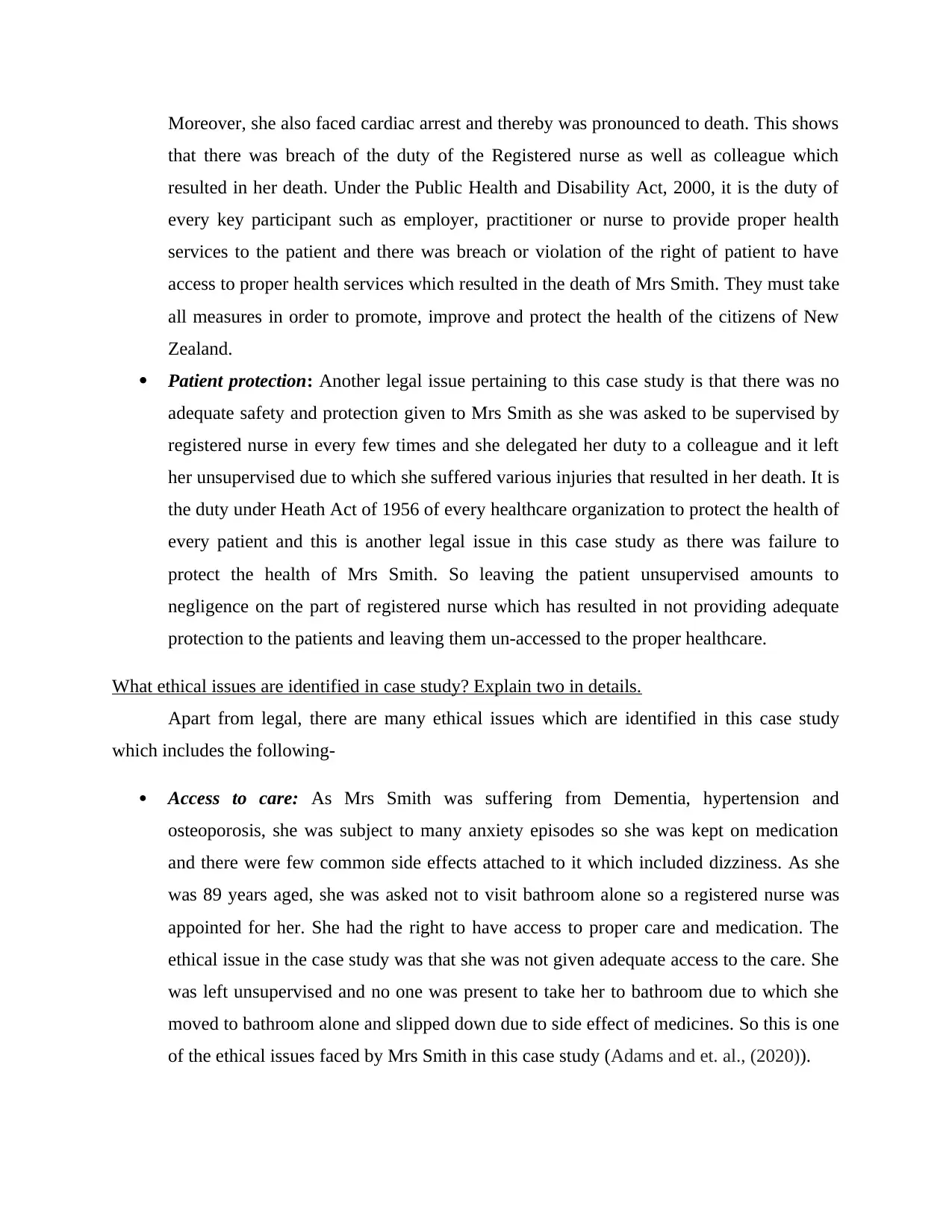
Moreover, she also faced cardiac arrest and thereby was pronounced to death. This shows
that there was breach of the duty of the Registered nurse as well as colleague which
resulted in her death. Under the Public Health and Disability Act, 2000, it is the duty of
every key participant such as employer, practitioner or nurse to provide proper health
services to the patient and there was breach or violation of the right of patient to have
access to proper health services which resulted in the death of Mrs Smith. They must take
all measures in order to promote, improve and protect the health of the citizens of New
Zealand.
Patient protection: Another legal issue pertaining to this case study is that there was no
adequate safety and protection given to Mrs Smith as she was asked to be supervised by
registered nurse in every few times and she delegated her duty to a colleague and it left
her unsupervised due to which she suffered various injuries that resulted in her death. It is
the duty under Heath Act of 1956 of every healthcare organization to protect the health of
every patient and this is another legal issue in this case study as there was failure to
protect the health of Mrs Smith. So leaving the patient unsupervised amounts to
negligence on the part of registered nurse which has resulted in not providing adequate
protection to the patients and leaving them un-accessed to the proper healthcare.
What ethical issues are identified in case study? Explain two in details.
Apart from legal, there are many ethical issues which are identified in this case study
which includes the following-
Access to care: As Mrs Smith was suffering from Dementia, hypertension and
osteoporosis, she was subject to many anxiety episodes so she was kept on medication
and there were few common side effects attached to it which included dizziness. As she
was 89 years aged, she was asked not to visit bathroom alone so a registered nurse was
appointed for her. She had the right to have access to proper care and medication. The
ethical issue in the case study was that she was not given adequate access to the care. She
was left unsupervised and no one was present to take her to bathroom due to which she
moved to bathroom alone and slipped down due to side effect of medicines. So this is one
of the ethical issues faced by Mrs Smith in this case study (Adams and et. al., (2020)).
that there was breach of the duty of the Registered nurse as well as colleague which
resulted in her death. Under the Public Health and Disability Act, 2000, it is the duty of
every key participant such as employer, practitioner or nurse to provide proper health
services to the patient and there was breach or violation of the right of patient to have
access to proper health services which resulted in the death of Mrs Smith. They must take
all measures in order to promote, improve and protect the health of the citizens of New
Zealand.
Patient protection: Another legal issue pertaining to this case study is that there was no
adequate safety and protection given to Mrs Smith as she was asked to be supervised by
registered nurse in every few times and she delegated her duty to a colleague and it left
her unsupervised due to which she suffered various injuries that resulted in her death. It is
the duty under Heath Act of 1956 of every healthcare organization to protect the health of
every patient and this is another legal issue in this case study as there was failure to
protect the health of Mrs Smith. So leaving the patient unsupervised amounts to
negligence on the part of registered nurse which has resulted in not providing adequate
protection to the patients and leaving them un-accessed to the proper healthcare.
What ethical issues are identified in case study? Explain two in details.
Apart from legal, there are many ethical issues which are identified in this case study
which includes the following-
Access to care: As Mrs Smith was suffering from Dementia, hypertension and
osteoporosis, she was subject to many anxiety episodes so she was kept on medication
and there were few common side effects attached to it which included dizziness. As she
was 89 years aged, she was asked not to visit bathroom alone so a registered nurse was
appointed for her. She had the right to have access to proper care and medication. The
ethical issue in the case study was that she was not given adequate access to the care. She
was left unsupervised and no one was present to take her to bathroom due to which she
moved to bathroom alone and slipped down due to side effect of medicines. So this is one
of the ethical issues faced by Mrs Smith in this case study (Adams and et. al., (2020)).
Secure Best Marks with AI Grader
Need help grading? Try our AI Grader for instant feedback on your assignments.
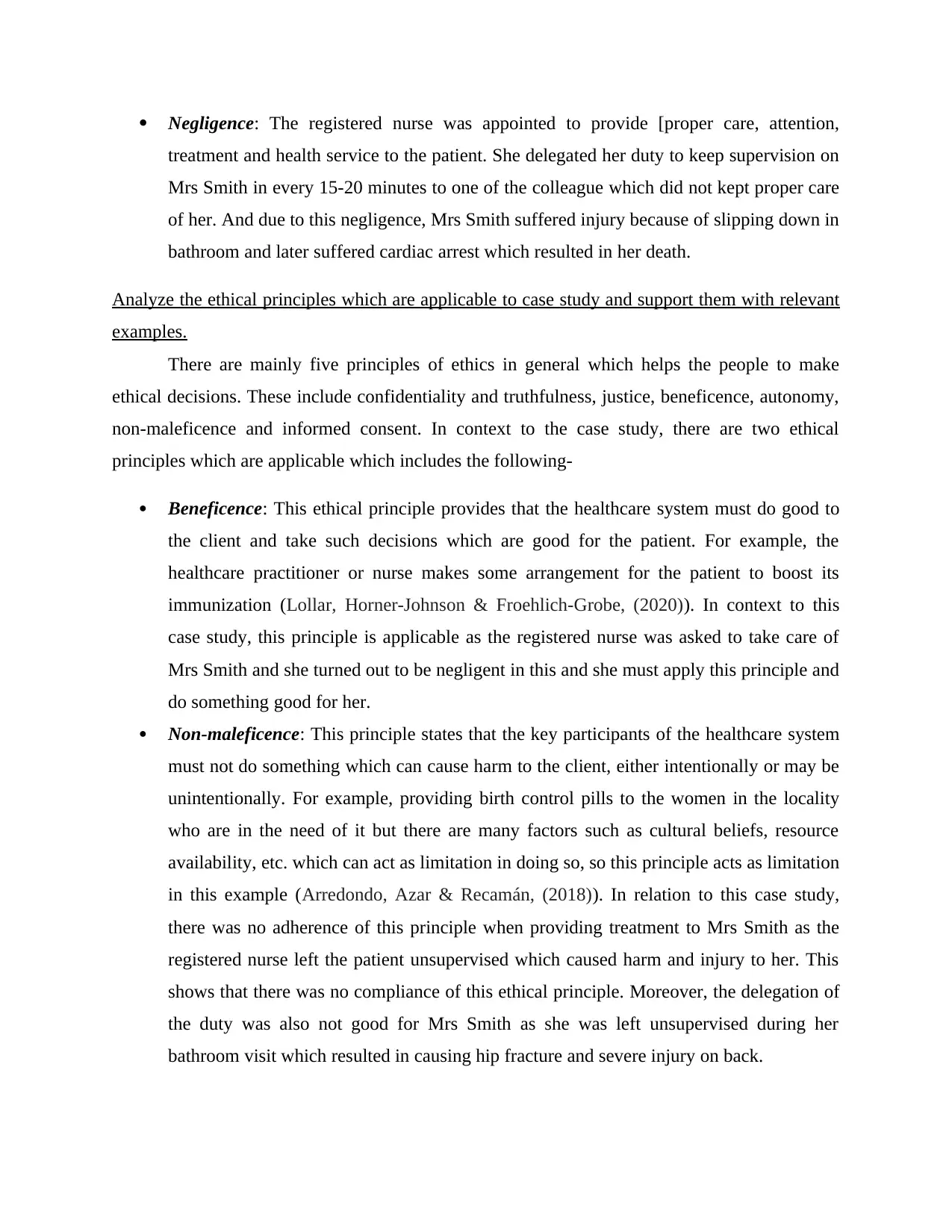
Negligence: The registered nurse was appointed to provide [proper care, attention,
treatment and health service to the patient. She delegated her duty to keep supervision on
Mrs Smith in every 15-20 minutes to one of the colleague which did not kept proper care
of her. And due to this negligence, Mrs Smith suffered injury because of slipping down in
bathroom and later suffered cardiac arrest which resulted in her death.
Analyze the ethical principles which are applicable to case study and support them with relevant
examples.
There are mainly five principles of ethics in general which helps the people to make
ethical decisions. These include confidentiality and truthfulness, justice, beneficence, autonomy,
non-maleficence and informed consent. In context to the case study, there are two ethical
principles which are applicable which includes the following-
Beneficence: This ethical principle provides that the healthcare system must do good to
the client and take such decisions which are good for the patient. For example, the
healthcare practitioner or nurse makes some arrangement for the patient to boost its
immunization (Lollar, Horner-Johnson & Froehlich-Grobe, (2020)). In context to this
case study, this principle is applicable as the registered nurse was asked to take care of
Mrs Smith and she turned out to be negligent in this and she must apply this principle and
do something good for her.
Non-maleficence: This principle states that the key participants of the healthcare system
must not do something which can cause harm to the client, either intentionally or may be
unintentionally. For example, providing birth control pills to the women in the locality
who are in the need of it but there are many factors such as cultural beliefs, resource
availability, etc. which can act as limitation in doing so, so this principle acts as limitation
in this example (Arredondo, Azar & Recamán, (2018)). In relation to this case study,
there was no adherence of this principle when providing treatment to Mrs Smith as the
registered nurse left the patient unsupervised which caused harm and injury to her. This
shows that there was no compliance of this ethical principle. Moreover, the delegation of
the duty was also not good for Mrs Smith as she was left unsupervised during her
bathroom visit which resulted in causing hip fracture and severe injury on back.
treatment and health service to the patient. She delegated her duty to keep supervision on
Mrs Smith in every 15-20 minutes to one of the colleague which did not kept proper care
of her. And due to this negligence, Mrs Smith suffered injury because of slipping down in
bathroom and later suffered cardiac arrest which resulted in her death.
Analyze the ethical principles which are applicable to case study and support them with relevant
examples.
There are mainly five principles of ethics in general which helps the people to make
ethical decisions. These include confidentiality and truthfulness, justice, beneficence, autonomy,
non-maleficence and informed consent. In context to the case study, there are two ethical
principles which are applicable which includes the following-
Beneficence: This ethical principle provides that the healthcare system must do good to
the client and take such decisions which are good for the patient. For example, the
healthcare practitioner or nurse makes some arrangement for the patient to boost its
immunization (Lollar, Horner-Johnson & Froehlich-Grobe, (2020)). In context to this
case study, this principle is applicable as the registered nurse was asked to take care of
Mrs Smith and she turned out to be negligent in this and she must apply this principle and
do something good for her.
Non-maleficence: This principle states that the key participants of the healthcare system
must not do something which can cause harm to the client, either intentionally or may be
unintentionally. For example, providing birth control pills to the women in the locality
who are in the need of it but there are many factors such as cultural beliefs, resource
availability, etc. which can act as limitation in doing so, so this principle acts as limitation
in this example (Arredondo, Azar & Recamán, (2018)). In relation to this case study,
there was no adherence of this principle when providing treatment to Mrs Smith as the
registered nurse left the patient unsupervised which caused harm and injury to her. This
shows that there was no compliance of this ethical principle. Moreover, the delegation of
the duty was also not good for Mrs Smith as she was left unsupervised during her
bathroom visit which resulted in causing hip fracture and severe injury on back.
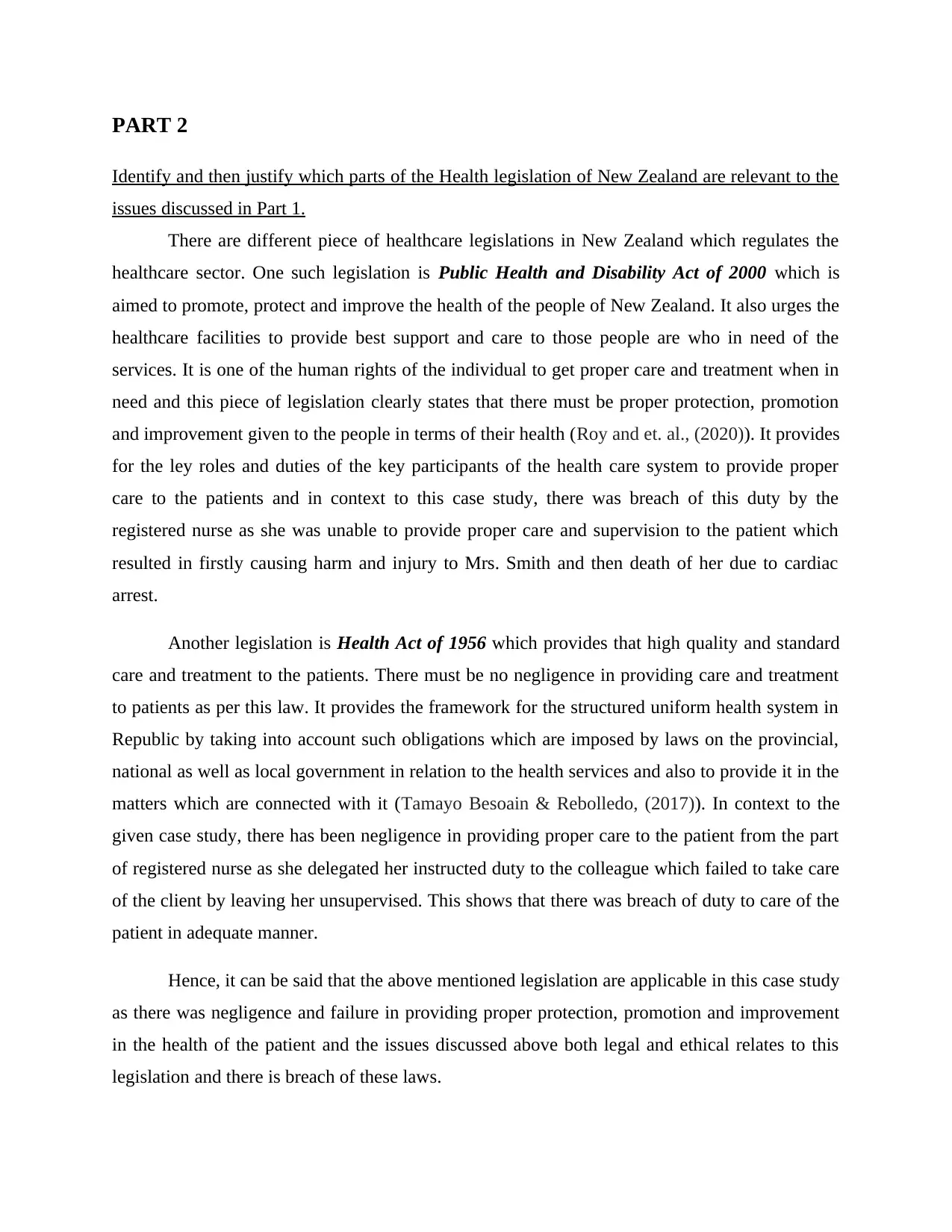
PART 2
Identify and then justify which parts of the Health legislation of New Zealand are relevant to the
issues discussed in Part 1.
There are different piece of healthcare legislations in New Zealand which regulates the
healthcare sector. One such legislation is Public Health and Disability Act of 2000 which is
aimed to promote, protect and improve the health of the people of New Zealand. It also urges the
healthcare facilities to provide best support and care to those people are who in need of the
services. It is one of the human rights of the individual to get proper care and treatment when in
need and this piece of legislation clearly states that there must be proper protection, promotion
and improvement given to the people in terms of their health (Roy and et. al., (2020)). It provides
for the ley roles and duties of the key participants of the health care system to provide proper
care to the patients and in context to this case study, there was breach of this duty by the
registered nurse as she was unable to provide proper care and supervision to the patient which
resulted in firstly causing harm and injury to Mrs. Smith and then death of her due to cardiac
arrest.
Another legislation is Health Act of 1956 which provides that high quality and standard
care and treatment to the patients. There must be no negligence in providing care and treatment
to patients as per this law. It provides the framework for the structured uniform health system in
Republic by taking into account such obligations which are imposed by laws on the provincial,
national as well as local government in relation to the health services and also to provide it in the
matters which are connected with it (Tamayo Besoain & Rebolledo, (2017)). In context to the
given case study, there has been negligence in providing proper care to the patient from the part
of registered nurse as she delegated her instructed duty to the colleague which failed to take care
of the client by leaving her unsupervised. This shows that there was breach of duty to care of the
patient in adequate manner.
Hence, it can be said that the above mentioned legislation are applicable in this case study
as there was negligence and failure in providing proper protection, promotion and improvement
in the health of the patient and the issues discussed above both legal and ethical relates to this
legislation and there is breach of these laws.
Identify and then justify which parts of the Health legislation of New Zealand are relevant to the
issues discussed in Part 1.
There are different piece of healthcare legislations in New Zealand which regulates the
healthcare sector. One such legislation is Public Health and Disability Act of 2000 which is
aimed to promote, protect and improve the health of the people of New Zealand. It also urges the
healthcare facilities to provide best support and care to those people are who in need of the
services. It is one of the human rights of the individual to get proper care and treatment when in
need and this piece of legislation clearly states that there must be proper protection, promotion
and improvement given to the people in terms of their health (Roy and et. al., (2020)). It provides
for the ley roles and duties of the key participants of the health care system to provide proper
care to the patients and in context to this case study, there was breach of this duty by the
registered nurse as she was unable to provide proper care and supervision to the patient which
resulted in firstly causing harm and injury to Mrs. Smith and then death of her due to cardiac
arrest.
Another legislation is Health Act of 1956 which provides that high quality and standard
care and treatment to the patients. There must be no negligence in providing care and treatment
to patients as per this law. It provides the framework for the structured uniform health system in
Republic by taking into account such obligations which are imposed by laws on the provincial,
national as well as local government in relation to the health services and also to provide it in the
matters which are connected with it (Tamayo Besoain & Rebolledo, (2017)). In context to the
given case study, there has been negligence in providing proper care to the patient from the part
of registered nurse as she delegated her instructed duty to the colleague which failed to take care
of the client by leaving her unsupervised. This shows that there was breach of duty to care of the
patient in adequate manner.
Hence, it can be said that the above mentioned legislation are applicable in this case study
as there was negligence and failure in providing proper protection, promotion and improvement
in the health of the patient and the issues discussed above both legal and ethical relates to this
legislation and there is breach of these laws.
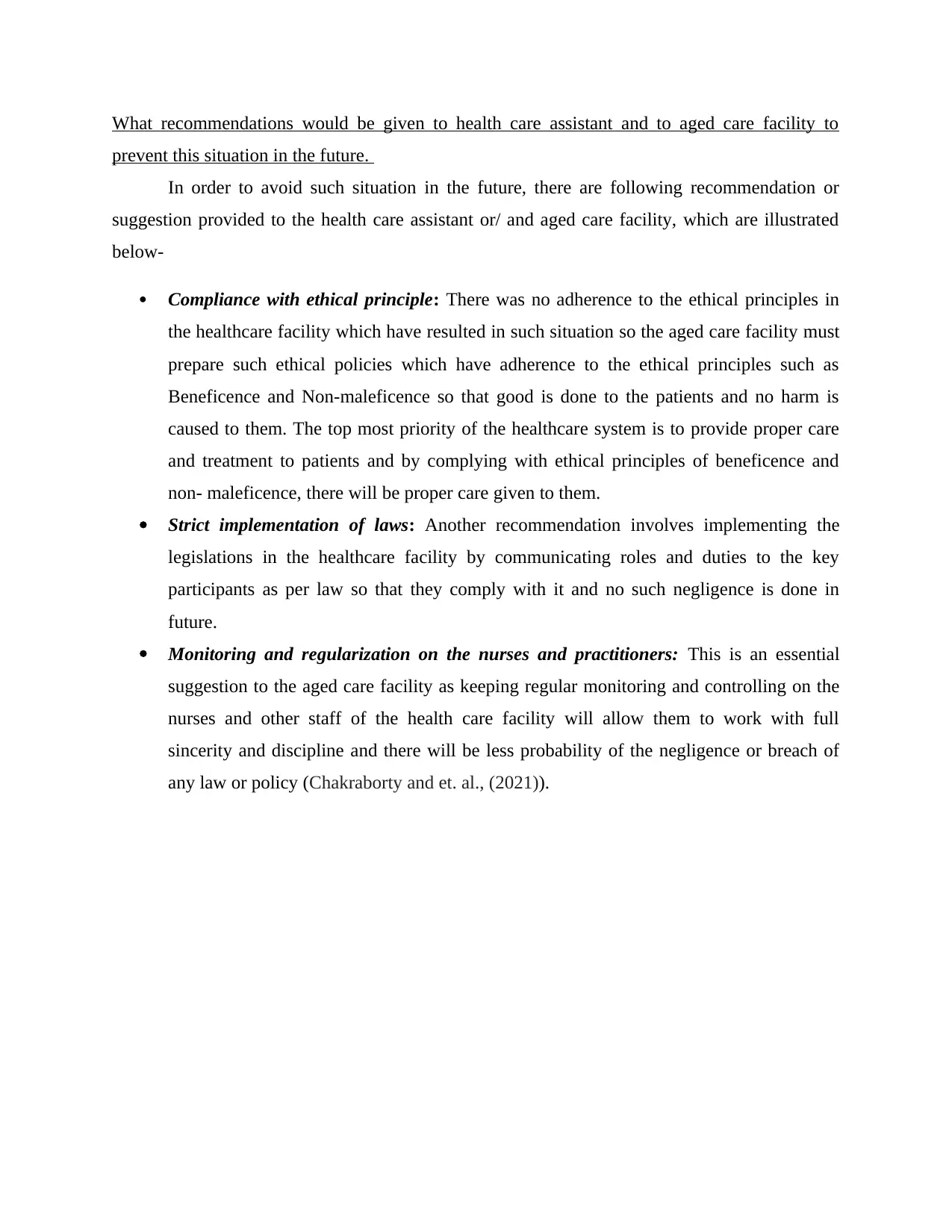
What recommendations would be given to health care assistant and to aged care facility to
prevent this situation in the future.
In order to avoid such situation in the future, there are following recommendation or
suggestion provided to the health care assistant or/ and aged care facility, which are illustrated
below-
Compliance with ethical principle: There was no adherence to the ethical principles in
the healthcare facility which have resulted in such situation so the aged care facility must
prepare such ethical policies which have adherence to the ethical principles such as
Beneficence and Non-maleficence so that good is done to the patients and no harm is
caused to them. The top most priority of the healthcare system is to provide proper care
and treatment to patients and by complying with ethical principles of beneficence and
non- maleficence, there will be proper care given to them.
Strict implementation of laws: Another recommendation involves implementing the
legislations in the healthcare facility by communicating roles and duties to the key
participants as per law so that they comply with it and no such negligence is done in
future.
Monitoring and regularization on the nurses and practitioners: This is an essential
suggestion to the aged care facility as keeping regular monitoring and controlling on the
nurses and other staff of the health care facility will allow them to work with full
sincerity and discipline and there will be less probability of the negligence or breach of
any law or policy (Chakraborty and et. al., (2021)).
prevent this situation in the future.
In order to avoid such situation in the future, there are following recommendation or
suggestion provided to the health care assistant or/ and aged care facility, which are illustrated
below-
Compliance with ethical principle: There was no adherence to the ethical principles in
the healthcare facility which have resulted in such situation so the aged care facility must
prepare such ethical policies which have adherence to the ethical principles such as
Beneficence and Non-maleficence so that good is done to the patients and no harm is
caused to them. The top most priority of the healthcare system is to provide proper care
and treatment to patients and by complying with ethical principles of beneficence and
non- maleficence, there will be proper care given to them.
Strict implementation of laws: Another recommendation involves implementing the
legislations in the healthcare facility by communicating roles and duties to the key
participants as per law so that they comply with it and no such negligence is done in
future.
Monitoring and regularization on the nurses and practitioners: This is an essential
suggestion to the aged care facility as keeping regular monitoring and controlling on the
nurses and other staff of the health care facility will allow them to work with full
sincerity and discipline and there will be less probability of the negligence or breach of
any law or policy (Chakraborty and et. al., (2021)).
Paraphrase This Document
Need a fresh take? Get an instant paraphrase of this document with our AI Paraphraser
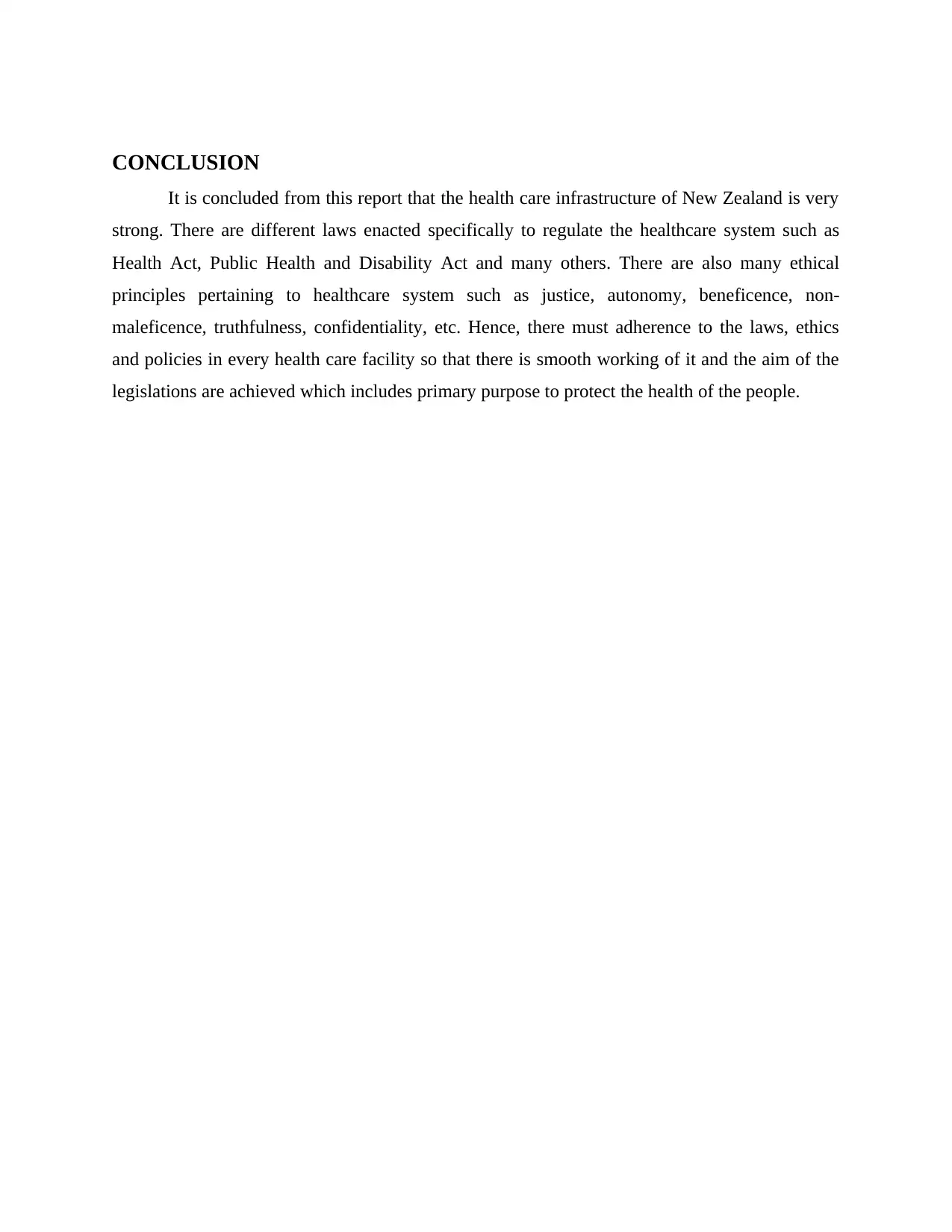
CONCLUSION
It is concluded from this report that the health care infrastructure of New Zealand is very
strong. There are different laws enacted specifically to regulate the healthcare system such as
Health Act, Public Health and Disability Act and many others. There are also many ethical
principles pertaining to healthcare system such as justice, autonomy, beneficence, non-
maleficence, truthfulness, confidentiality, etc. Hence, there must adherence to the laws, ethics
and policies in every health care facility so that there is smooth working of it and the aim of the
legislations are achieved which includes primary purpose to protect the health of the people.
It is concluded from this report that the health care infrastructure of New Zealand is very
strong. There are different laws enacted specifically to regulate the healthcare system such as
Health Act, Public Health and Disability Act and many others. There are also many ethical
principles pertaining to healthcare system such as justice, autonomy, beneficence, non-
maleficence, truthfulness, confidentiality, etc. Hence, there must adherence to the laws, ethics
and policies in every health care facility so that there is smooth working of it and the aim of the
legislations are achieved which includes primary purpose to protect the health of the people.
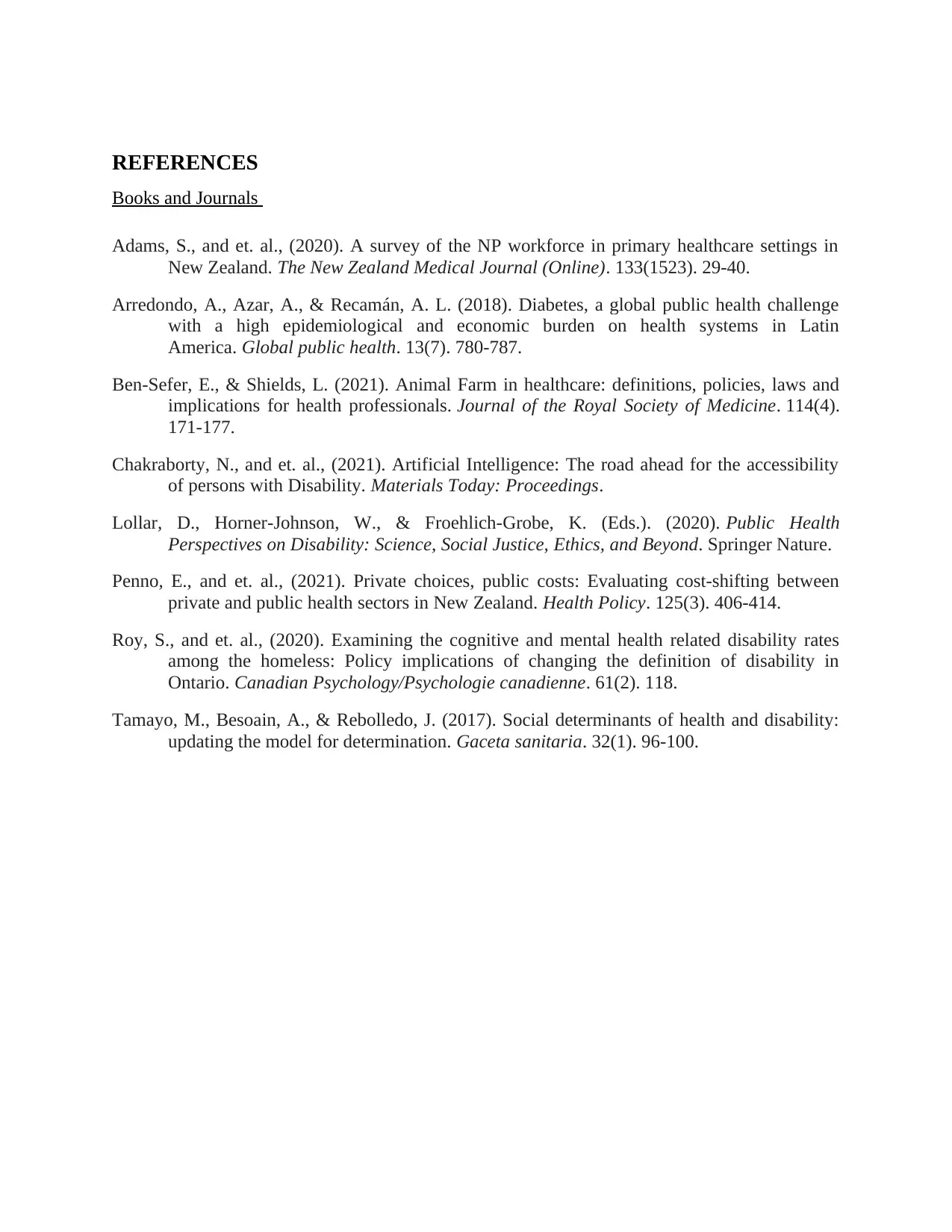
REFERENCES
Books and Journals
Adams, S., and et. al., (2020). A survey of the NP workforce in primary healthcare settings in
New Zealand. The New Zealand Medical Journal (Online). 133(1523). 29-40.
Arredondo, A., Azar, A., & Recamán, A. L. (2018). Diabetes, a global public health challenge
with a high epidemiological and economic burden on health systems in Latin
America. Global public health. 13(7). 780-787.
Ben-Sefer, E., & Shields, L. (2021). Animal Farm in healthcare: definitions, policies, laws and
implications for health professionals. Journal of the Royal Society of Medicine. 114(4).
171-177.
Chakraborty, N., and et. al., (2021). Artificial Intelligence: The road ahead for the accessibility
of persons with Disability. Materials Today: Proceedings.
Lollar, D., Horner-Johnson, W., & Froehlich-Grobe, K. (Eds.). (2020). Public Health
Perspectives on Disability: Science, Social Justice, Ethics, and Beyond. Springer Nature.
Penno, E., and et. al., (2021). Private choices, public costs: Evaluating cost-shifting between
private and public health sectors in New Zealand. Health Policy. 125(3). 406-414.
Roy, S., and et. al., (2020). Examining the cognitive and mental health related disability rates
among the homeless: Policy implications of changing the definition of disability in
Ontario. Canadian Psychology/Psychologie canadienne. 61(2). 118.
Tamayo, M., Besoain, A., & Rebolledo, J. (2017). Social determinants of health and disability:
updating the model for determination. Gaceta sanitaria. 32(1). 96-100.
Books and Journals
Adams, S., and et. al., (2020). A survey of the NP workforce in primary healthcare settings in
New Zealand. The New Zealand Medical Journal (Online). 133(1523). 29-40.
Arredondo, A., Azar, A., & Recamán, A. L. (2018). Diabetes, a global public health challenge
with a high epidemiological and economic burden on health systems in Latin
America. Global public health. 13(7). 780-787.
Ben-Sefer, E., & Shields, L. (2021). Animal Farm in healthcare: definitions, policies, laws and
implications for health professionals. Journal of the Royal Society of Medicine. 114(4).
171-177.
Chakraborty, N., and et. al., (2021). Artificial Intelligence: The road ahead for the accessibility
of persons with Disability. Materials Today: Proceedings.
Lollar, D., Horner-Johnson, W., & Froehlich-Grobe, K. (Eds.). (2020). Public Health
Perspectives on Disability: Science, Social Justice, Ethics, and Beyond. Springer Nature.
Penno, E., and et. al., (2021). Private choices, public costs: Evaluating cost-shifting between
private and public health sectors in New Zealand. Health Policy. 125(3). 406-414.
Roy, S., and et. al., (2020). Examining the cognitive and mental health related disability rates
among the homeless: Policy implications of changing the definition of disability in
Ontario. Canadian Psychology/Psychologie canadienne. 61(2). 118.
Tamayo, M., Besoain, A., & Rebolledo, J. (2017). Social determinants of health and disability:
updating the model for determination. Gaceta sanitaria. 32(1). 96-100.
1 out of 9
Related Documents
Your All-in-One AI-Powered Toolkit for Academic Success.
+13062052269
info@desklib.com
Available 24*7 on WhatsApp / Email
![[object Object]](/_next/static/media/star-bottom.7253800d.svg)
Unlock your academic potential
© 2024 | Zucol Services PVT LTD | All rights reserved.





